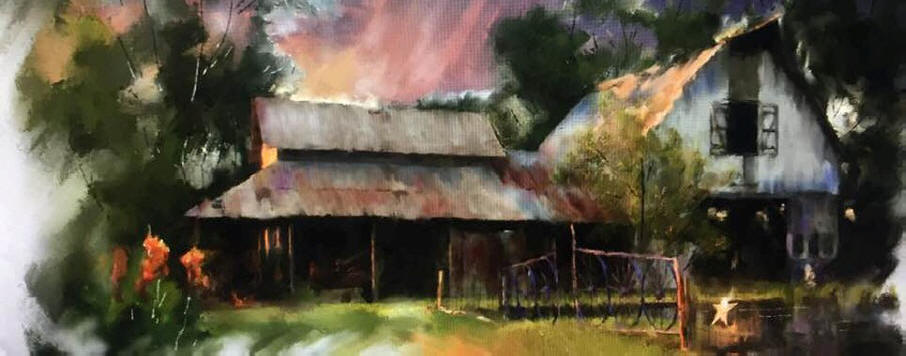
~ Delta Poetry Review ~
Delta Blues: Requiem for a Forty Mile Bend Farm
Bones
Hinges, long consumed by rust, creak as the wind
whispers to them.
A door, once held by a frame long gone, adds a
dull thud.
Cypress boards bleached smooth to a silvery
finish, shine like bones in the
sunlight and sigh as the wind moves through the
barn’s remnants.
Everything for farm life gone, nothing left. Just
bones, except for the black beaded eyes attached to a coiled body,
peering out from under the foundation – waiting silently for the Tit
Mouse to pass near, then more bones.
The Postman Doesn’t Ring Here
Anymore!
A plow’s edge sticks solidly out of red clay,
surrounded by red, dust covered gravel, the county’s gift to the farm. A
steel rod runs forward in the clay and then juts upward, standing
straight with two red rusted rings dangling.
But no leather reins attach to them. No mule
labors to move the plow through a dusty field. No mules left in the
Forty Mile Bend. No share croppers left in the Forty Mile Bend.
Just a plow blade holding up an ancient, tin mail
box, its flag arm raised, but the flag is missing, along with the mule
and its driver. No one in the abandoned house and so, the postman
doesn’t ring here anymore.
Miz’ Sara’s Ashes
The backhoe growls like the cougars that used to prowl the swamp of the
Tallahatchie. A hole gouged in the hard, red clay yawns open, a huge
grave.
The shell of a house stands at the precipice leaning backward to avoid
slipping in. The cypress boards that it used to keep the family warm sit
neatly stacked, soon to keep a new house warm.
The backhoe driver, his black skin dripping sweat from the summer heat,
removes his straw hat and shakes his head –
“This Miz Sara’s house. She was the maid at the Mr. Frank’s house for
fifty years. She gone now.”
The young farmer considers this as he stares at the house. “Need space
for new tractors to pass.” And with that he moves forward with the
gasoline and torch.
The house leans further back, but no escape, and soon it writhes in the
flames.
In just minutes fifty years are gone, only a pile of smoldering ashes
left. The backhoe pushes them into the grave, begins to cover them with
red clay. A few embers escape and float upward.
Looking skyward no one sees the tiny woman standing at the edge of the
tree line, staring through tears at the grave. Then the apparition
disappears and nothing is left but Miz Sara’s Ashes.
Pamela Ebel was born in Northern California and raised by southern women, part of the diaspora created by the Great Depression. She returned to her roots at 21, receiving an MA from LSU-Baton Rouge and a JD from Loyola-New Orleans. A lawyer, professor, associate dean, and writer, she travels between New Orleans, Alabama and the Mississippi Delta, sharing tales from the crossroads, because, like the ancient Greeks and the Irish, as a southern writer she knows you can't outrun your blood.
| Archive | Submissions | About |